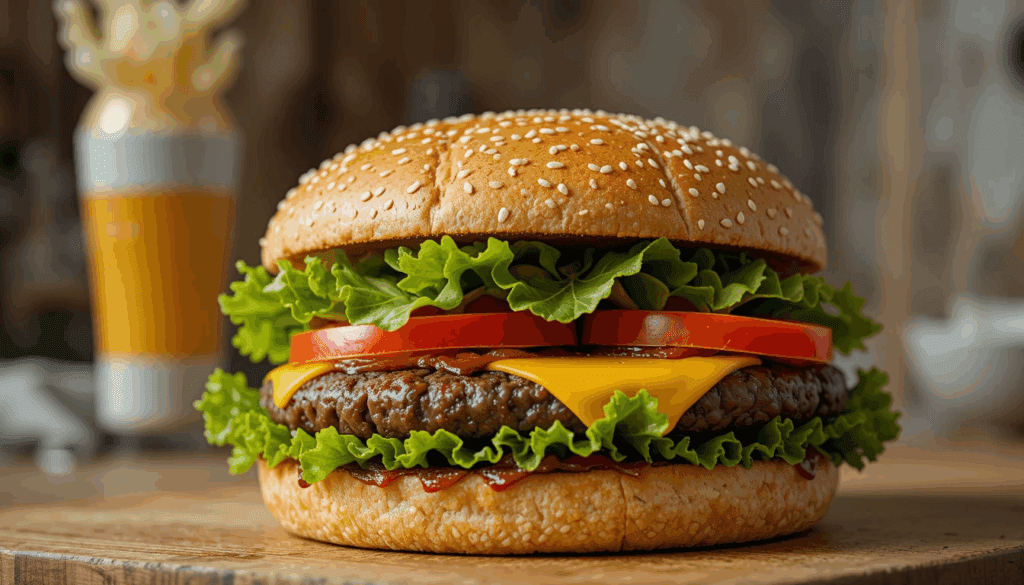Hamburger nutrition is one of the hot topic that people keeps asking about, because everyone loves burgers but at same time worry about calories, fats and health. A hamburger is not only a fast food item, it’s a cultural meal that been enjoyed all over world. When you eat burger, you may be thinking only about taste, but there’s also a big story about nutrition hidden inside that bun.
This article explore hamburger nutrition in a simple but detail way, including calories, proteins, carbs, vitamins, and also pros and cons. We also talk about how to enjoy it in better way without sacrificing health.
What is Hamburger Nutrition?
Table of Contents
ToggleHamburger nutrition is basically the analysis of what nutrients, calories, fat and proteins a hamburger contain. A regular hamburger usually include a beef patty, bun, cheese, lettuce, tomato, sauce, and sometimes extra topping like bacon.
Each ingrediant add it’s own nutrition value. For example, beef patty is full of protein, bun give carbs, cheese have calcium, and veggies add vitamins. But sauces and fried patty also increase sodium and unhealthy fats.
So, hamburger nutrition will always depends on how its prepared, the size, and what you put inside.
Key Features of Hamburger Nutrition
Hamburger nutrition is interesting because it offers both good and bad qualities.
-
Protein Source: Beef patty is high in protein which is good for muscles building.
-
Carbohydrates: Bun provide energy but sometimes too much refined carbs.
-
Fats: Hamburgers can be high in saturated fats. Too much of that is bad for heart.
-
Vitamins & Minerals: Tomato, lettuce and onions add Vitamin C, fiber, and antioxidants.
-
Calories: Average hamburger have between 250 to 500 calories, depending on size and ingredients.
These features shows hamburgers are not all unhealthy, but balance and portion size is key.
Calories Breakdown
-
Small hamburger with no cheese: 250–300 cal.
-
Medium burger with cheese: 400–500 cal.
-
Double cheeseburger: 700–900 cal or more!
How to Understand and Use Hamburger Nutrition
When people eat burgers, they don’t always think about nutrition. But if you understand hamburger nutrition, you can enjoy without guilt.
-
Choose lean beef or chicken patty instead of fatty beef.
-
Go for whole grain bun instead of white refined bun.
-
Add fresh veggies like tomato, onion, lettuce for vitamins.
-
Skip extra cheese or heavy mayo sauces.
-
Eat with salad side instead of fries.
These small changes makes burger healthier and nutrition balanced.
Pros and Cons of Hamburger Nutrition
Like every food, hamburgers have both advantages and disadvantages.
Pros
-
High in protein, good for growth and muscle repair.
-
Contain iron and zinc from beef.
-
Easy and quick source of energy.
-
Tasty and versatile, so people enjoy eating.
Cons
-
High in saturated fat, which increase heart risks.
-
Too many calories if portion is large.
-
Sodium levels are often very high.
-
Processed sauces add sugar and unhealthy chemicals.
Hamburger nutrition is like double-edged sword, you get benefits but also some risks if eaten in excess.
Expert Tips for Healthy Hamburger Nutrition
Experts suggest not to cut burger totally from diet, but eat in moderation.
Portion Control
Instead of eating giant double patty burger, go for single patty with more veggies. Smaller portion reduces calories and fat.
Smart Substitutes
-
Use grilled chicken patty instead of fried beef.
-
Replace mayo with avocado spread.
-
Try whole wheat bun.
-
Use less cheese or low-fat cheese.
A hamburger is one of the most popular fast foods worldwide, but its nutrition depends on the size, ingredients, and preparation method. Let me give you a clear breakdown of hamburger nutrition:
Basic Hamburger Nutrition (1 regular beef patty, plain bun, no toppings)
Serving size: 1 hamburger (about 100–120 g)
-
Calories: ~250–300 kcal
-
Protein: 12–15 g
-
Fat: 9–12 g
-
Saturated fat: ~3–5 g
-
-
Carbohydrates: 26–30 g
-
Fiber: ~1–2 g
-
Sugar: ~4–5 g
-
-
Sodium: 400–500 mg
-
Cholesterol: ~40–50 mg
Nutrition from Beef Patty
-
Calories: 200–250 (depending on fat content)
-
Protein: 14–20 g (good source of muscle-building protein)
-
Fat: 10–15 g (higher in fatty cuts)
-
Iron & Zinc: Essential for blood and immunity
Nutrition from Bun
-
Calories: 120–150
-
Carbs: 25–28 g
-
Fiber: Low (unless whole wheat is used)
-
Sugar: 3–5 g (added in processed buns)
Toppings and Their Impact
-
Cheese slice: +70–100 calories, +5–7 g fat, +4–6 g protein
-
Bacon: +80–100 calories, +7 g fat, +4 g protein
-
Mayonnaise / sauces: +50–100 calories per tablespoon (mostly fat)
-
Lettuce, tomato, onions, pickles: Very low calories, add vitamins and fiber
Health Benefits of Hamburgers
-
Protein-rich: Supports muscle growth and repair
-
Iron & Zinc: Good for energy and immunity
-
Customizable: Can be made healthier with lean meat, whole wheat buns, and veggies
Health Concerns
-
High in calories & fat: Can lead to weight gain if eaten often
-
Processed ingredients: Fast-food versions often high in sodium and preservatives
-
Saturated fat & cholesterol: May affect heart health if consumed excessively
How to Make a Hamburger Healthier
-
Choose lean beef, chicken, or turkey patties
-
Use a whole wheat bun or lettuce wrap
-
Add plenty of vegetables for fiber
-
Limit cheese, bacon, and sauces
-
Grill instead of fry the patty

